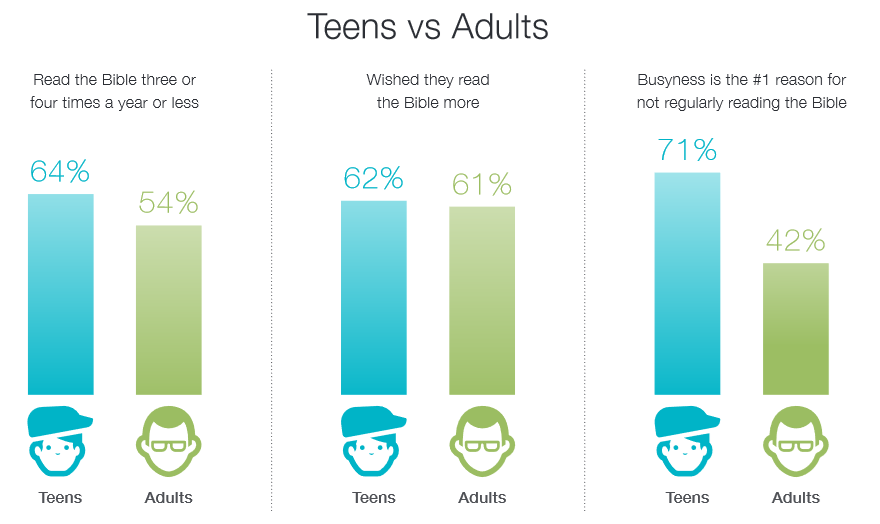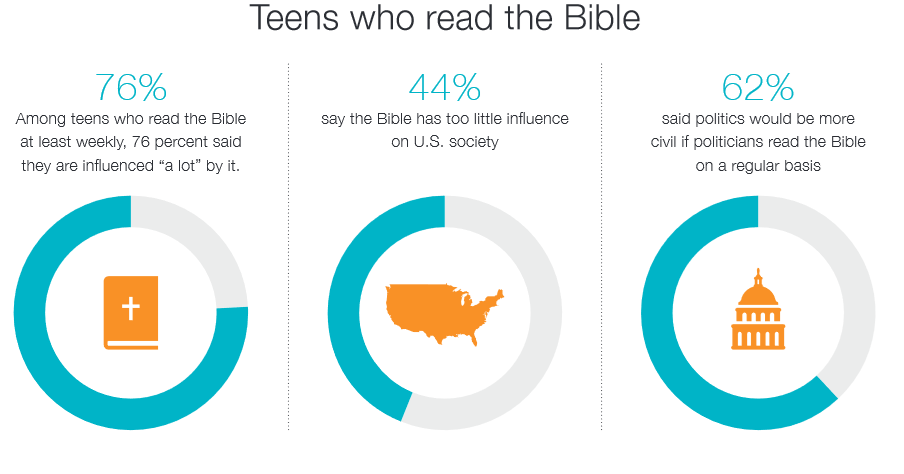
Virtually all Americans ages 13 to 17 who identify as Protestant, attend a religious service at least once a month, and say their faith is very important in their life, own a Bible.
And most of them are reading it, according to a new survey from the American Bible Society and Barna Group. Almost three-quarters read their Bible weekly or more: 16 percent read every day, 37 percent read several times a week, and 21 percent read once a week. Another 13 percent read once a month, 5 percent read three or four times a year, and 8 percent read less than that.
When you add in the 91 percent that hear the Bible read aloud at church once a week or more, it adds up to about 95 percent of practicing Protestant teens (79% of whom are non-mainline) hearing or reading the Bible at least weekly.

The numbers are similar to their adult counterparts—in a similar survey, 80 percent of practicing adult Protestants said they read the Bible once a week or more, and 90 percent hear the Bible read aloud at least once a week at a worship service.
Teens aren’t sitting down to read for a long time: Bible-reading, practicing Protestant teens average 22.8 minutes a day, compared to 35.1 minutes for adults. At each sitting, roughly 3 out of 10 teens read for less than 15 minutes (28%), for 15 to 29 minutes (32%), and for 30 to 44 minutes (27%). Just 7 percent read for 45 to 59 minutes; another 7 percent read for more than an hour at a time.
While about the same percentages of adults read for 15 to 29 minutes (29%) and 30 to 44 minutes (31%), fewer read for less than 15 minutes (8%) and more read for more than an hour (25%).
About half of teens (53%) said their level of Bible engagement stayed the same in the past year. One in four (39%) said it went up, while one in ten (8%) said it went down—numbers which track closely with the adult trends.
The reasons for the change in teen reading habits weren’t broken down by denomination. About half (55%) of American teens overall said they read more because they came to understand Bible reading as an important part of their faith journey, while a quarter (26%) said a difficult experience caused them to search for dictions and answers. About one in five (18%) said they experienced a significant change in their lives or saw how the Bible changed someone they knew for the better.
More than 1 in 10 teens (14%) said their reading increased because they went to a church where the Bible became more accessible to them, or said someone they knew asked them to read the Bible with them. Another 10 percent read more because they downloaded the Bible onto their smartphone or tablet.
Among American teens who read the Bible less in the past year, 71 percent said they were too busy with responsibilities like jobs or families, and 16 percent said they were put off by a significant change in their lives, like the death of a loved one or loss of a job. Another 13 percent said they saw how the Bible made little difference in the life of someone they knew, and 12 percent said a difficult experience caused them to doubt their faith.

Even more than adults, practicing Protestant teens said they wished they read the Bible more (96% of teens, compared with 84% of adults). More than a quarter (28%) said they were frustrated that they didn’t have more time to read, while 13 percent said their frustration came from difficulty in relating to biblical language. Another 8 percent don’t understand the background or history of the Bible, and 7 percent simply don’t feel excited about reading it.
But three-quarters of teens said they were motivated to read the Bible because it brings them closer to God. Another 11 percent said they read because knew they were supposed to, and 7 percent said they needed comfort. Just 3 percent said they had a problem to solve or needed direction, and 2 percent said it was part of their studies at school.
While most teens prefer to read their Bible in print (67%, compared to 78% of adults), more than a quarter (26%) said they would rather read on their smart phone, compared to 13 percent of adults. And fewer teens (10%) than adults (22%) read the Bible in a liturgical text, such as the Book of Common Prayer or the Liturgy of the Hours.
All practicing Protestant teens said the Bible had an influence on their lives, whether that was a lot (76%), some (22%), or a little (2%). They all also reported being very active (92%) or somewhat active (8%) in their church.
The vast majority of practicing Protestant teens (88%) strongly agree that the Bible contains everything a person needs to know to live a meaningful life, slightly more than the 85 percent of practicing Protestant adults who answered the same way.
The study also noted:
- When they read the Bible, practicing Protestant teens felt encouraged/inspired (30%), like they got a sense of direction (25%), peaceful (21%), hopeful (13%), and happy (11%).
- They also felt confusion (23%), overwhelmed (21%), bored (8%), and discouraged, guilty, or sinful (6%). Almost 3 in 10 (29%) said they didn’t feel any negative emotions when reading their Bibles.
- Two out of five preferred to read the New International Version, twice as many as Protestant adults (20%). The numbers flipped for the King James Version—20 percent of teens and 41 percent of adults preferred it. About 15 percent of teens and 10 percent of adults favored the New King James Version, while 8 percent of teens and 4 percent of adults preferred the New Living Translation. About the same number (7% of teens, 6% of adults) preferred the English Standard Version.
- Slightly more teens (78%) than adults (74%) said that the Bible has too little influence in US society today. More teens (93%) than adults (81%) also said that politics would be more civil if politicians read the Bible on a regular basis.
- Fewer teens (65%) than adults (76%) said the Bible is best described by the word “inspired,” while more teens (17%) than adults (11%) describe it as a rulebook. About the same percentage (12% of teens, 11% of adults) say the Bible is best described as “historical.”
- The same number of teens and adults (68%) believe that the Bible is available in all of the world’s languages. (It’s not.)
- When teens see someone else reading a Bible in a public place, 78 percent are happy to see another Christian around. The sight makes 64 percent feel encouraged and 63 percent feel joyful. It reminds 56 percent to read their own Bible.
- Seven in 10 practicing Protestant teens said they are very likely to attend church after graduating from high school or moving away from home. Another quarter (26%) said that was somewhat likely, and 3 percent said they weren’t sure.
- Teens are less sure of their Bible knowledge than adults: only 10 percent said they were highly knowledgeable, compared to 18 percent of adults. About 31 percent of teens said they were moderately knowledgeable, compared with 42 percent of adults. Instead, those teens judge themselves as somewhat knowledgeable (48%, compared to 36% of adults).
- Half of teens said the Bible was the inspired word of God that contained no errors, though some verses were symbolic. Fewer (41%) said it was the actual word of God and should be taken literally, word for word. A small minority (5%) said it is the inspired word of God but has factual or historical errors.
- Three-quarters of teens (75%) said the Bible’s main message is the story of who God is and his desire to have a relationship with the people he created, compared to just half (48%) of adults. In contrast, 2 out of 5 adults (40%) said the Bible’s main message is that God is love, compared with only 1 in 5 teens (18%).
- Less than half of both teens (43%) and adults (41%) knew that the Bible states that the truth will set you free. More adults (30%) than teens (25%) said the Bible states that God works in mysterious ways. Similarly, more adults than teens believe the Bible contains, “To thine own self be true” (15% of adults, compared to 5% of teens), while about the same amount think it contains, “God helps those who help themselves” (7% of adults and 8% of teens). Far more teens (19%) than adults (7%) admitted that they weren’t sure which statement was in the Bible.
- Teens were better versed on the identity of Abraham’s son—85 percent knew it was Isaac, compared to 74 percent of adults. Most (82%) also knew that Esther was the name of a book of the Bible (compared to 78% of adults).
- Every teen strongly agreed that their religious faith was very important in their life today. Almost all agreed that the miracles in the Bible took place (98%), that the Bible provides a clear and totally accurate description of moral truth (98%), and that the Bible’s absolute moral truths are the same for people in all situations, without exceptions (90%).
- A strong majority of teens agreed that the Bible provides practical standards of living in today’s world (89%) and specifically condemns homosexuality (81%).
- They were less certain about whether the Bible teaches that God helps those who help themselves (60% agreed), or whether the Bible advises people to not get divorced but doesn’t describe it as a sin (53% agreed).

Support Our Work
Subscribe to CT for less than $4.25/month




















